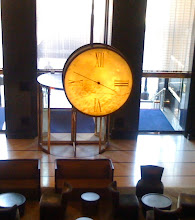There is more than one way to see. A leaf turns to the light. A chimpanzee selects a piece of fruit. A fish sees a smaller fish. An eagle sees a rabbit. A dolphin rescues a sailor. A dog welcomes us home. While all of these actions are guided by a process falling under the general heading of Intelligence, humans seem to be fairly unique in our ability for conscious thought. We see, we know, and we know we know.
This is a blessing and it carries a price. To know you live is to know you die. Having studied several cats at close range over a period of years, I've concluded they don't give it a moment's notice. They know they want to live, which is why they get out of trouble as fast as they can. Then they take a nap.
- Posted using BlogPress from my iPhone
